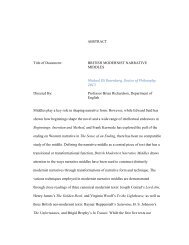PSYCHOTHERAPY ENGAGERS VERSUS NON-ENGAGERS
PSYCHOTHERAPY ENGAGERS VERSUS NON-ENGAGERS
PSYCHOTHERAPY ENGAGERS VERSUS NON-ENGAGERS
Create successful ePaper yourself
Turn your PDF publications into a flip-book with our unique Google optimized e-Paper software.
differ in their confidence about overcoming their problems and have satisfying lives prior<br />
to the intake session. Although, on average, non-engagers were less hopeful than<br />
engagers, the differences at a medium effect size did not reach statistical significance.<br />
With a larger sample size and greater statistical power, this effect may have reached<br />
statistical significance.<br />
Conclusions<br />
Overall, the patterns of helping skills (more approval-reassurance with non-<br />
engagers than engagers at the beginning of sessions, somewhat more reflections of<br />
feeling but somewhat less information about the process of helping with non-engagers<br />
than engagers at the end of sessions), the finding that non-engagers were higher in<br />
anxious attachment style than engagers, and the finding that non-engagers reported a<br />
higher need for therapy prior to therapy, provide evidence that intake sessions differ with<br />
engagers compared to non-engagers. The non-engagers may have elicited more approval-<br />
reassurance from their therapists at the beginning of the session due to verbal or<br />
nonverbal signs of anxiety about forming a new therapeutic relationship, and/or signs that<br />
they are desperate for help. Such non-engagers may have been more focused on obtaining<br />
immediate help from their therapists at the end of the session than the less-anxiously-<br />
attached, less-desperate continuers, and thus elicited somewhat more reflections of<br />
feeling and somewhat less information about the helping process at the end of the<br />
session. Strikingly, the attachment style findings were similar to that of Marmarosh et al.<br />
(2009), in which dropouts were also more anxiously attached than engagers.<br />
113

















